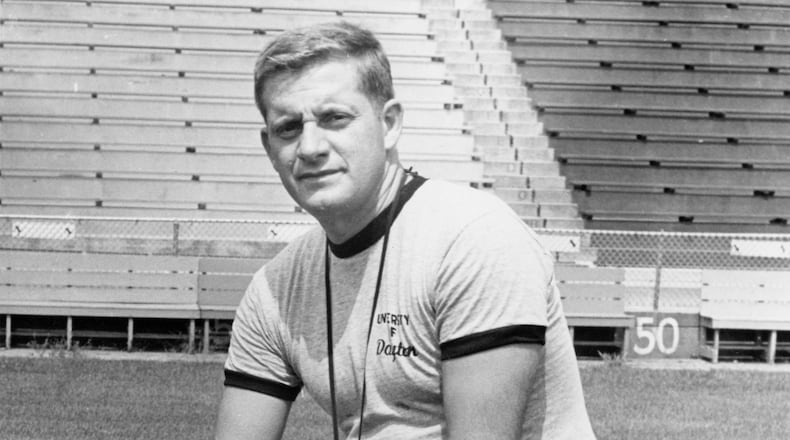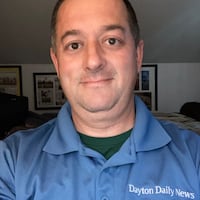McVay’s assistants included: George Perles, who became a coaching legend as a defensive coordinator with the Pittsburgh Steelers and then as the head coach at Michigan State; Tom Moore, a four-time Super Bowl champion as an assistant coach; and Jerry Hanlon, who was on Bo Schembechler’s staff at Michigan for 21 years; Wayne Fontes, who would coach the Detroit Lions for nine seasons; and Jim Gruden, the father of two future NFL head coaches, Jon and Jay.
McVay, who died on Tuesday at 91, built a coaching tree that extended to his own family. His grandson Sean McVay coached the Los Angeles Rams to a Super Bowl championship last season.
While John McVay played center for Miami University and was a senior captain in 1952 and coached Dayton for eight seasons (1965-1972), he is most famous for building the San Francisco 49ers dynasty of the 1980s and early 1990s. He held various roles over 22 seasons, including general manager. The 49ers won five Super Bowls during his tenure.
“We had so much fun,” McVay said in 2005 of his time with the 49ers. “If Camelot existed, that was Camelot.”
The 49ers released a statement on McVay’s death that read, “This is a very sad day for our organization and the entire football community. John McVay was a driving force in constructing teams for our five Super Bowl titles. Most importantly, John was a Hall of Fame person who built genuine and sincere relationships with front office staff, coaches and players. John’s commitment and contributions to the 49ers created the standard and tradition we strive to carry on today. Our thoughts and prayers are with the McVay family.”
The Miami football program also released a statement that read, “We are saddened by the news of John McVay’s passing. Our thoughts are with the entire McVay family.”
At Dayton, coach Rick Chamberlin remembered meeting McVay twice, once when he was a player in the 1970s and Dayton had a game at Fordham while McVay was the head coach of the New York Giants and again in 2001 when UD played at Saint Mary’s in California, not far from San Francisco.
“What stood out to me was his professionalism,” Chamberlin said. “Some people, that’s kind of their essence, their demeanor, and that’s what I came away with when I met him. I just thought, ‘Wow, this is a guy that is knows what to do and has confidence just in the way he speaks and the way he carries himself’.”
Dayton Daily News coverage of the hiring of John McVay as Dayton football coach on Jan. 7, 1965. McVay, would later help build the San Francisco 49ers dynasty, died on Tuesday at 91. https://t.co/UCENQBbMif pic.twitter.com/P9ZJDzVjmT
— David Jablonski (@DavidPJablonski) November 2, 2022
We are saddened by the news of John McVay’s passing. Our thoughts are with the entire McVay family. pic.twitter.com/sK3nnkxMVZ
— Miami Football (@MiamiOHFootball) November 2, 2022
The 49ers mourn the loss of former General Manager John McVay.
— San Francisco 49ers (@49ers) November 1, 2022
Inducted into the Edward J. DeBartolo, Sr. 49ers Hall of Fame in 2013, McVay spent 22 seasons with the 49ers.
Our entire organization sends our condolences to the McVay family.
McVay was born in Bellaire, Ohio, and attended Massillon High School. He played center, guard, fullback and linebacker and was a member of a state championship team as a senior in 1948.
After high school, he played at Miami University, spending two seasons with head coach Woody Hayes, the future Ohio State coach, and then two seasons with Ara Parseghian, the future Notre Dame coach. All three are members of Miami’s Cradle of Coaches. McVay was inducted in 1997.
McVay played center for Miami and was a captain of the freshman team and then a captain of the varsity team as a senior in 1952. One of his teammates was Schembechler. McVay was named the team’s most efficient lineman as a junior and senior.
“The program listed me as a 198-pound, six-footer,” McVay said in 1965. “Actually, I’m 5-10, and I played at 168.”
McVay said he learned about coaching attitude from Parseghian.
“The day he became head coach, several of us came into his office to congratulate him,” McVay said. “We waited for him to tell us a joke or something. He said, with a stern look, ‘Is there anything I can do for you gentlemen?’ It was as though he had pulled a lever or pressed a button. He was the head coach now, and his relationship with the players had changed. It had to be that way, of course.”
McVay copied some of that approach.
“Look, to be frank about it, I never really liked any coach I ever played for while I was on the team,” he said. “But when I looked back and saw what they were trying to accomplish, I appreciated them. Off the field, I’m approachable. I don’t expect to be considered a nice guy on the field.”
McVay started his coaching career as an assistant at Lancaster High School in 1953. After three years there, he spent one season as the head coach at Franklin High School and then had a five-year stint (1957-61) at Canton Central Catholic, where his teams were 41-7.
McVay entered the college coaching ranks as an assistant backfield coach at Michigan State for three seasons before getting the job at UD. McVay said he had a chance to coach at Ohio State with Hayes, but already had an offer from Duffy Daugherty at Michigan State.
McVay was 34 when he beat out 55 other applicants — 17 of whom were interviewed in person by Athletic Director Tom Frericks for the head coaching job at Dayton in January of 1965. McVay replaced Pete Ankney, who resigned a month earlier, and received a three-year contract.
When McVay was hired by Dayton, he said his first move would be “to get our recruiting program in gear and to get my staff together as quickly as I can.” He wanted to recruit heavily in Ohio. At that point, UD had not had a winning season since 1957.
“I have always felt you could win here,” McVay said. “I think the program is sound, and I think more recent changes made indicate the soundness in the setup. I know the drawing power Dayton has, and I feel the university can attract the type of boy we want. We play in an excellent league. For me to say, we will win 80% of our games would be unsound. But I think we will have a respectable football team.”
McVay’s first Dayton team finished 1-8-1, but his second team improved to 8-2 in 1966. McVay coached the program through the 1972 season and then moved into the athletic director position in 1973.
In 1974, McVay left UD to become the head coach of the Toronto Northmen in the new World Football League. Months later, the Northmen became the Memphis Southmen, and that’s where McVay’s pro football career began, though the WFL folded in 1975. McVay coached the New York Giants to a 14-23 record in three seasons (1976-78) and then began his run with the 49ers as director of player personnel in February of 1979, months after being fired by the Giants.
The 49ers won Super Bowls in the 1981, 1984, 1988, 1989 and 1994 seasons. McVay was named NFL Executive of the Year in 1989 after a victory against the Cincinnati Bengals in Super Bowl XXIII. McVay retired in 1995 but returned to the 49ers in 1999 as vice president and director of football operations and worked through the 2003 season.
“I had never lived in the West until I took the San Francisco job in ‘79,” McVay said in 1992 when he returned to Dayton to speak to the Agonis Club. “When I went to work, I never dreamed I’d be there all this time. You don’t think of that kind of stability in this business. Before I joined the 49ers, the longest I had ever been anywhere was Dayton.”
About the Author

